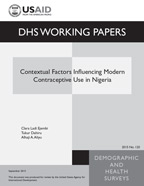- PUBLICATIONS
- JOURNAL ARTICLES
- ORDER PUBLICATIONS
Publications Summary
- Document Type
- Working Papers
- Publication Topic(s)
- Family Planning
- Country(s)
- Nigeria
- Language
- English
- Recommended Citation
- Ejembi, Clara Ladi, Tukur Dahiru, and Alhaji A. Aliyu. 2015. Contextual Factors Influencing Modern Contraceptive Use in Nigeria. DHS Working Papers No. 120. Rockville, Maryland, USA: ICF International.
- Download Citation
- RIS format / Text format / Endnote format
- Publication Date
- September 2015
- Publication ID
- WP120
Download
 Contextual Factors Influencing Modern Contraceptive Use in Nigeria (PDF, 635K)
Contextual Factors Influencing Modern Contraceptive Use in Nigeria (PDF, 635K)
